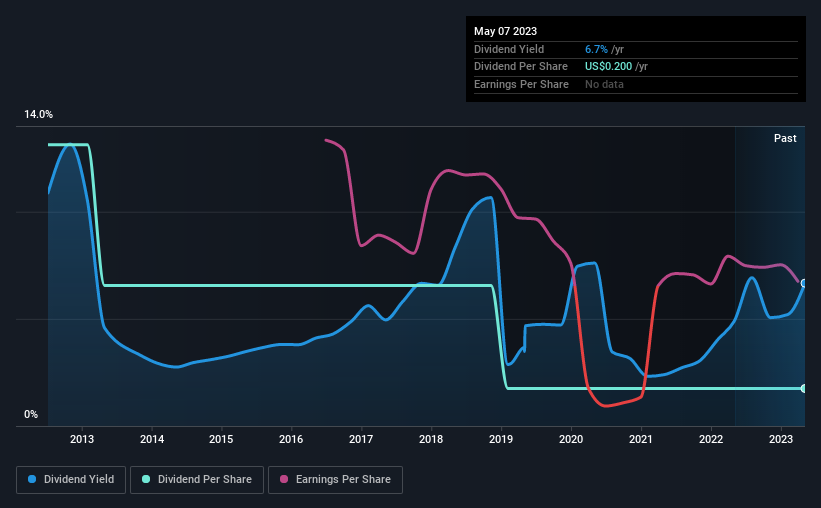Pitney Bowes (NYSE:PBI) Has Affirmed Its Dividend Of $0.05
Pitney Bowes Inc. (NYSE:PBI) will pay a dividend of $0.05 on the 8th of June. This makes the dividend yield 6.7%, which will augment investor returns quite nicely.
While the dividend yield is important for income investors, it is also important to consider any large share price moves, as this will generally outweigh any gains from distributions. Pitney Bowes' stock price has reduced by 32% in the last 3 months, which is not ideal for investors and can explain a sharp increase in the dividend yield.
Check out our latest analysis for Pitney Bowes
Pitney Bowes Is Paying Out More Than It Is Earning
If the payments aren't sustainable, a high yield for a few years won't matter that much. Based on the last payment, Pitney Bowes' profits didn't cover the dividend, but the company was generating enough cash instead. Given that the dividend is a cash outflow, we think that cash is more important than accounting measures of profit when assessing the dividend, so this is a mitigating factor.
Earnings per share is forecast to rise by 93.9% over the next year. If the dividend continues on its recent course, the payout ratio in 12 months could be 160%, which is a bit high and could start applying pressure to the balance sheet.
Dividend Volatility
The company has a long dividend track record, but it doesn't look great with cuts in the past. Since 2013, the dividend has gone from $1.50 total annually to $0.20. Dividend payments have fallen sharply, down 87% over that time. Declining dividends isn't generally what we look for as they can indicate that the company is running into some challenges.
Dividend Growth Potential Is Shaky
Given that dividend payments have been shrinking like a glacier in a warming world, we need to check if there are some bright spots on the horizon. Over the past five years, it looks as though Pitney Bowes' EPS has declined at around 47% a year. A sharp decline in earnings per share is not great from from a dividend perspective. Even conservative payout ratios can come under pressure if earnings fall far enough. Over the next year, however, earnings are actually predicted to rise, but we would still be cautious until a track record of earnings growth can be built.
Pitney Bowes' Dividend Doesn't Look Sustainable
In summary, while it's good to see that the dividend hasn't been cut, we are a bit cautious about Pitney Bowes' payments, as there could be some issues with sustaining them into the future. The payments haven't been particularly stable and we don't see huge growth potential, but with the dividend well covered by cash flows it could prove to be reliable over the short term. We would be a touch cautious of relying on this stock primarily for the dividend income.
It's important to note that companies having a consistent dividend policy will generate greater investor confidence than those having an erratic one. Meanwhile, despite the importance of dividend payments, they are not the only factors our readers should know when assessing a company. To that end, Pitney Bowes has 4 warning signs (and 1 which is a bit unpleasant) we think you should know about. If you are a dividend investor, you might also want to look at our curated list of high yield dividend stocks.
Have feedback on this article? Concerned about the content? Get in touch with us directly. Alternatively, email editorial-team (at) simplywallst.com.
This article by Simply Wall St is general in nature. We provide commentary based on historical data and analyst forecasts only using an unbiased methodology and our articles are not intended to be financial advice. It does not constitute a recommendation to buy or sell any stock, and does not take account of your objectives, or your financial situation. We aim to bring you long-term focused analysis driven by fundamental data. Note that our analysis may not factor in the latest price-sensitive company announcements or qualitative material. Simply Wall St has no position in any stocks mentioned.
Join A Paid User Research Session
You’ll receive a US$30 Amazon Gift card for 1 hour of your time while helping us build better investing tools for the individual investors like yourself. Sign up here

